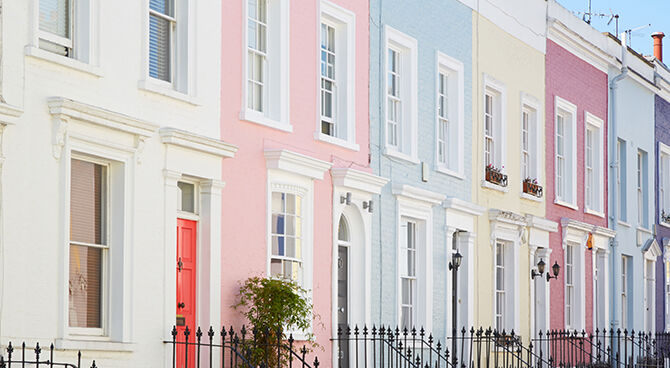UK house prices 'stagnate' amid spending squeeze
The latest Halifax House Price Index shows that house prices in the UK have fallen 0.2 per cent between February and April reflecting growing problems of affordability and a squeeze on household spending.

Annual price growth: lowest since March 2013
Annual price growth, according to the Halifax method of calculation, stood at 3.8 per cent last month, its lowest rate since March 2013, reflecting growing problems of affordability and a squeeze on household spending.Martin Ellis, Halifax housing economist, said, “House prices have stagnated over the past three months.“Housing demand appears to have been curbed in recent months due to a deterioration in housing affordability driven by the sustained period of rapid house price growth during 2014-16. Signs of a decline in the pace of job creation, and the beginnings of a squeeze on households’ finances as a result of increasing inflation, may also be constraining the demand for homes.“A continued low mortgage rate environment, combined with an ongoing acute shortage of properties for sale, should nonetheless help continue to underpin house prices over the coming months.”Annual house price growth set to slow
Mr Ellis said that Halifax expected annual house price growth to slow down to anything between one and four per cent by the end of the year. The average house price across the UK now stands at £219,649.Jonathan Hopper, managing director of Garrington Property Finders, commented, “April was a curiously frustrating month for the property market. Just as the engine of price growth had begun to rev more freely, the surprise election announcement applied the brakes.“The net effect has been to leave the market stuck idling in the middle of the road. But the mediocre average figures mask the wildly different conditions at opposite ends of the market.“Properties in some regions continue to see double-digit price reductions, while at certain price points in the most in-demand areas, gazumping is back with a vengeance.“Such volatile conditions are being driven by two conflicting forces – patchy demand but a near universal shortage of supply. With RICS reporting that the number of properties coming onto the market has fallen for 13 months in a row, in many areas buyers outnumber the number of homes for sale.“With the election campaign unlikely to either unblock supply or coax more buyers into taking the plunge, the listless limbo is set to continue until June.“However if the election delivers a clear result that puts Brexit firmly back on track, the property market could receive a huge boost, freeing up more supply and spurring discretionary buyers into action.”Rising inflation is curbing demand for property
Jonathan Samuels, chief executive of specialist property lender Octane Capital, added, “Rising inflation is without doubt hitting demand for property, as prospective buyers start to feel the pinch.“But there are other forces at play. The property market is experiencing an affordability hangover from the price growth of recent years, while ongoing Brexit negotiations and cross-Channel spats are also creating uncertainty.“Combine the rising cost of living with muted wage growth, add in political and economic uncertainty, and a period of prolonged house price stagnation is a real possibility.“Yes, the lack of supply will prevent prices from falling sharply, and record low mortgage rates will continue to provide support but for now this remains very much a sideways moving market.“With the general election approaching, it's hard to see any material uplift in activity until the autumn. A lot is riding on the direction of inflation.”'Annual level still above this time last year'
Jeremy Leaf, north London estate agent and a former residential chairman of the Royal Institution of Chartered Surveyors, said, “Unfortunately, low mortgage rates and a shortage of property haven’t been enough to support prices, as is reflected in these figures. But on the other hand we are quite encouraged that the annual level is still above where it was this time last year, bearing in mind the huge increase in demand ahead of the introduction of the three per cent stamp duty surcharge last April.“Looking forward, we are finding the market to be relatively balanced between supply and demand and still expect those people who recognise current market conditions to take advantage. The market does seem to be finding a new, slightly lower, level and we are certainly seeing no signs of a more substantial fall.”Related news:
- Affordability affecting UK housing market: Nationwide
- House building surges to ten-year high in first quarter
- Global house prices rise at fastest rate in two years
Howard Archer, an economist at IHS Markit, added, “We suspect markedly weakening consumer fundamentals, likely mounting caution over making major spending decisions, and elevated house price to earnings ratios will weigh down further on housing market activity and house prices over the coming months. However, a shortage of supply is likely to put a floor under prices.”For related news and features, visit our Residential Property section.Access hundreds of global services and suppliers in our Online Directory
 Get access to our free Global Mobility Toolkit
Get access to our free Global Mobility Toolkit 
©2024 Re:locate magazine, published by Profile Locations, Spray Hill, Hastings Road, Lamberhurst, Kent TN3 8JB. All rights reserved. This publication (or any part thereof) may not be reproduced in any form without the prior written permission of Profile Locations. Profile Locations accepts no liability for the accuracy of the contents or any opinions expressed herein.




























